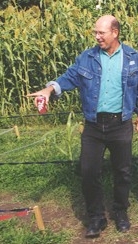-- unusual mazes with unusual rules. Some are interactive (using Java), some use weirdly shaped rolling blocks, and some you can actually walk through.
(or . . . the Site Formerly Known
as “Robert Abbott’s Mazes”)
“Robert Abbott’s Mazes” didn’t really describe the site because I also have mazes by Richard Tucker, Adrian Fisher, Erich Friedman, John McCallion, and Andrea Gilbert. In the future I hope to add mazes by others. The “Mazes” part of the site’s name was also not quite right because they aren’t really mazes.
But what exactly are these puzzles? In the past I’ve referred to them as “mazes-with-
I hope a better name will help us popularize this form of puzzle. I could see more use of logic mazes in books, mechanical puzzles, and walk-
If “logic mazes” really became an accepted term, I thought that someone might reserve
I should explain why this site has a new name and a new location. The explanation may go on a little too long, so if your mind starts to wander just scroll down to the heading Puzzles to see what else is on the site.
And what exactly does “logic mazes” mean? Well, you can’t really get too exact here. Mostly a logic maze is like a logic puzzle, except it’s a maze. If you want more extensive rationalization, you could say that a logic maze is a closed system of rules in the same way that a logic system is a closed set of rules.
www.logicmazes.com, so I reserved it myself. Then I found out that it’s just as easy to
move my site to the address as it is to reserve it. So, that’s why I’m at this new address.
Puzzles
[That’s all I copied from December’s home page.]
